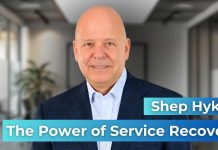As a small business owner and entrepreneur, it may seem like challenges are waiting at every corner. And sometimes they are. So it’s critical to understand how to manage stress and move beyond failure. On today’s show, we’re pleased to welcome Bill Blalock, author, motivational speaker, and coach, to walk us through his new book available now called, Living Your Legacy Now, Inspiring Life Lessons for a Successful, Healthy and Fulfilling Life.
Transcription:
Jim Fitzpatrick:
Welcome, and thanks so much for joining us, Bill, on the show.
Bill Blalock:
Thanks, Jim. It’s a pleasure to be here today.
Jim Fitzpatrick:
Sure. So you must be a very busy guy right now with a title of a book like that, because this is a book I’m sure everybody’s going to want to read. I’ve got a copy of it right here. Living Your Legacy Now. I think through the pandemic, everybody said, wait a minute, what am I doing? I got to take control of my life right now. A, I might not have it much longer because there’s a lot of people passing away here around me due to this terrible virus. And hopefully we’re at the tail end of it or somewhat. But at the same time, I think it had everybody look inside themselves to say, what does make me happy? And what am I doing with my life? So your book is very timely. So I can’t wait to talk to you about it today. But through the past year so much has been uncertain for so many across the nation. What recommendations do you have for entrepreneurs and business owners in managing stress?
Bill Blalock:
Yeah, when it comes to stress, there’s two kinds of stress. There’s good stress and bad stress. And I think we all experienced bad stress with the pandemic because it changed the whole landscape of business and the way we relate to each other. And so, it gives us an opportunity to do a few things that I have encouraged other people to do. It’s basically a head and a heart kind of thing, because when stress hits us, we react emotionally. And when we do that, it’s very difficult from a cognitive standpoint to think clearly and strategically.
Bill Blalock:
So I encourage a lot of people when they encounter stress in their business, one of the things that’s help to do is, every day, start your day off in a sense of meditation or calm before your day starts. Just a feeling of gratitude or an appreciation for what you have in your family, your life and your faith. And just a moment of silence to regroup yourself so that you can begin to think clearly. And for some people it’s prayer, for some it’s meditation, whatever it is. And that helps set the pace for you to sit down and set some priorities for the day. And when you do that, it helps.
Bill Blalock:
But a second component of that is if you’re a business, don’t do it alone. You know, there are a lot of mastermind groups around the country that professionals can link themselves into, or some businesses or business leaders can get together and share one another’s experience and share processes and skillsets that they can deploy to sort of address the stress or the business issue that they’re dealing with in the moment. So it’s a matter of calmness, setting priorities, not doing it alone, collaborating in sort of mastermind groups, and really setting an environment where you can really overcome the stress, and use it as a vehicle to make some positive changes.
Jim Fitzpatrick:
That’s right. And everybody, I don’t care who you are, is dealing with stress, whether you’re a six year old going into first grade or whether you’re 60 years old running a company, or even in retirement. I mean, there are just things that just cause stress in our lives. And once we-
Bill Blalock:
Well, the big thing is to go for a walk in your surroundings or start some form of a workout routine where you exercise on a consistent basis, because that helps in addressing that level of stress in your life.
Jim Fitzpatrick:
That’s right. So in your new book, Living Your Legacy Life Now, Inspiring Life Lessons for a Successful, Healthy and Fulfilling Life, you discuss personal life impacting business and performance. Talk to us more about that.
Bill Blalock:
Right. Well, the main thing is, people always tell me, I separate my business from my personal life. And the fact is, whatever happens at home and the family, you bring it into your work environment because it affects you emotionally. And in many cases, if you’re dealing with something in your family or in your neighborhood or your child, it affects your ability to focus. And so, I tell individuals, you can’t separate the two. I had one gentleman, one time, an executive, we came out of a meeting and we’re going. And he was very intimate and said that, “I am very successful. And I separate things from my family and my business, because I can focus on my business a hundred percent.” I said, “Fine, let’s go to your office.” So we go to his office, I walk in there and I look around me. And you’ve seen it as I have, pictures of his little kids’ artwork and his family and his wife, and they’re all around him. And I said, “Look at your office, you’re surrounded by your family.”
Jim Fitzpatrick:
That’s right. That’s your wife.
Bill Blalock:
“That’s your life. And you look at these pictures during the day and you think, wow, what’s going on at home? Or my boy’s got a ball game later this afternoon. Or my daughter’s got a dance recital. You can’t separate the two.” But if things are good at home and in your life and in your faith, you approach the day a hundred percent differently, and you can focus and you can zone in on what needs to be done.
Jim Fitzpatrick:
There’s no question about it. And for those that make that comment, that silly comment, that I separate the two, it’s impossible to do. It really is, at the end of the day.
Bill Blalock:
It’s impossible.
Jim Fitzpatrick:
It might be a goal. It might be a wish that you do that. It might be something that somebody strives to do. But it’s literally impossible to do. It’s like saying, well, I change my blood every time I leave the office and I put home blood in. It doesn’t happen.
Bill Blalock:
It doesn’t work.
Jim Fitzpatrick:
It doesn’t work.
Bill Blalock:
It doesn’t happen.
Jim Fitzpatrick:
There’s no question. Where do business owners sometimes go wrong?
Bill Blalock:
Well, this is more times than not. They try to control everything. As an entrepreneur and you’re starting out, sure you’re involved in things. But as the business grows, you need good people. You need bench strength to draw from. And what I found in many cases, they say, “Bill, I need you to help me because I don’t have enough time. I can’t get this done.” And I say, “Wait a minute. Hold it. Where’s your team? Where are they?” “Well, they’re out there.” I say, “Well, what are they doing?” And we go over that. There are highly qualified individuals. I said, “Well, you need to let go of some control here. You need to pass off some of this to your team, your bench strength, because then you can be strategic.”
Bill Blalock:
Now this is where they miss it. They’re all tactical. They’re in the thick of it on a day to day basis. And they can’t see the vision and begin to plan for the company, and to seek opportunities where they can really overcome stressful situations, and things that change in the economy, and their surroundings. So that’s what I tell them all the time. “You have got to build bench strength, you’ve got to depend on them, and you can’t do it all by yourself. You need to be more strategic in your approach.”
Jim Fitzpatrick:
And your employees, for the most part, I think I’m safe in saying this. Most teams want that from their leader. They want to be able to do more, because it’s the only way they can grow in developing their strengths within that company and their value to that company. If I’m an employee at a company and I come in on day one and I’m there four years later and I’m still doing the same thing I was doing on day one, and I haven’t grown at all, then I’m looking around, right? So the only way that’s going to happen is when that boss comes in and says, “Hey, I think you can do more than what you’re doing, and to develop you as a human being and as a future leader of the company. So they really yearn for that. Don’t they, employees?
Bill Blalock:
Oh, they do. They want to build in self confidence. And as an example, when I was with Coca-Cola Enterprises. I’d have people come into me and, first of all, they have this idea how we can solve this problem. And I would always say, “All right, tell me the solution. I don’t want you to bring the problem to me. What do you think ought to be done?” And all of a sudden they’re like, “Well, aren’t you going to…” “No, no. I want you to tell me, because you apparently have an approach to this solution.” And they would tell me, and I said, “Okay, go do it.”
Jim Fitzpatrick:
Yeah. That’s right.
Bill Blalock:
And I kept emphasizing in them. You have the capacity to make decisions and I’m entrusting you and empowering you to be active and contribute value to the company. So as a result, I had fewer visits and more actionable steps on behalf of others that helped solve problems and move the company forward.
Jim Fitzpatrick:
That’s right. So what are some of the other takeaways from the book? It’s a phenomenal book. I’m not done reading it yet. But for everyone that’s out there, this is a must read. If you’re in business, whether it be for yourself, a small business owner, or you work in a big business, all of these rules apply. And as I said, I’m not done with the book yet. But everything that I’ve read in the book I love. But what do you want the reader to leave with? What are some of the key points that you would want the reader to leave with?
Bill Blalock:
Okay. The book is designed, there’s over 60 life lessons. And the way it’s formatted, people love it. Because, as you indicated, there’s a quote. And then the life lesson is only about a page or two or three or four.
Jim Fitzpatrick:
Yeah. It’s an easy read.
Bill Blalock:
Easy read. Quick bites. You can apply it, use some of the resources and apply it to your life. Now, some of these areas, and I refer to a list I made here real quick. In other words, building character, initiative, forgiving yourself. Building self-esteem, initiative, loyalty, change management, hope, overcoming failure and being decisive. These are just a few of the life lessons. And there’s also value lessons. It starts off with truth, what is truth and what is not truth? And the last chapter is on retirement. So I cover from A to Z in the whole book.
Jim Fitzpatrick:
Cradle to grave in this book. From the time you go into business to the time you’re out of business, right?
Bill Blalock:
That’s right. But it’ll make you a better person.
Jim Fitzpatrick:
There’s no question about it. And some of the things that I read, I went, I know that. But because they’re in this book and I read them, it was just a reaffirmation of those ideas and principles. And I think that’s where it’s so good. And then of course, there’s a lot in the book that I didn’t know. And I didn’t look at life a certain way. So thank you for sharing that in the book. But for everyone that’s out there, phenomenal book by a great guy, Living Your Legacy Now, Inspiring Life Lessons for a Successful, Healthy and Fulfilling Life, which is what we all want, whether you’re in business or not. So Mr. Bill Blalock, author, speaker, and coach, thank you so much for joining us on the show. We very much appreciate it. Love to have you back.
Bill Blalock:
Well, thank you, Jim. I’d love the opportunity.
Jim Fitzpatrick:
Great. Thanks.
The Atlanta Small Business Network, from start-up to success, we are your go-to resource for small business news, expert advice, information, and event coverage.
While you’re here, don’t forget to subscribe to our email newsletter for all the latest business news know-how from Atlanta Small Business Network.







